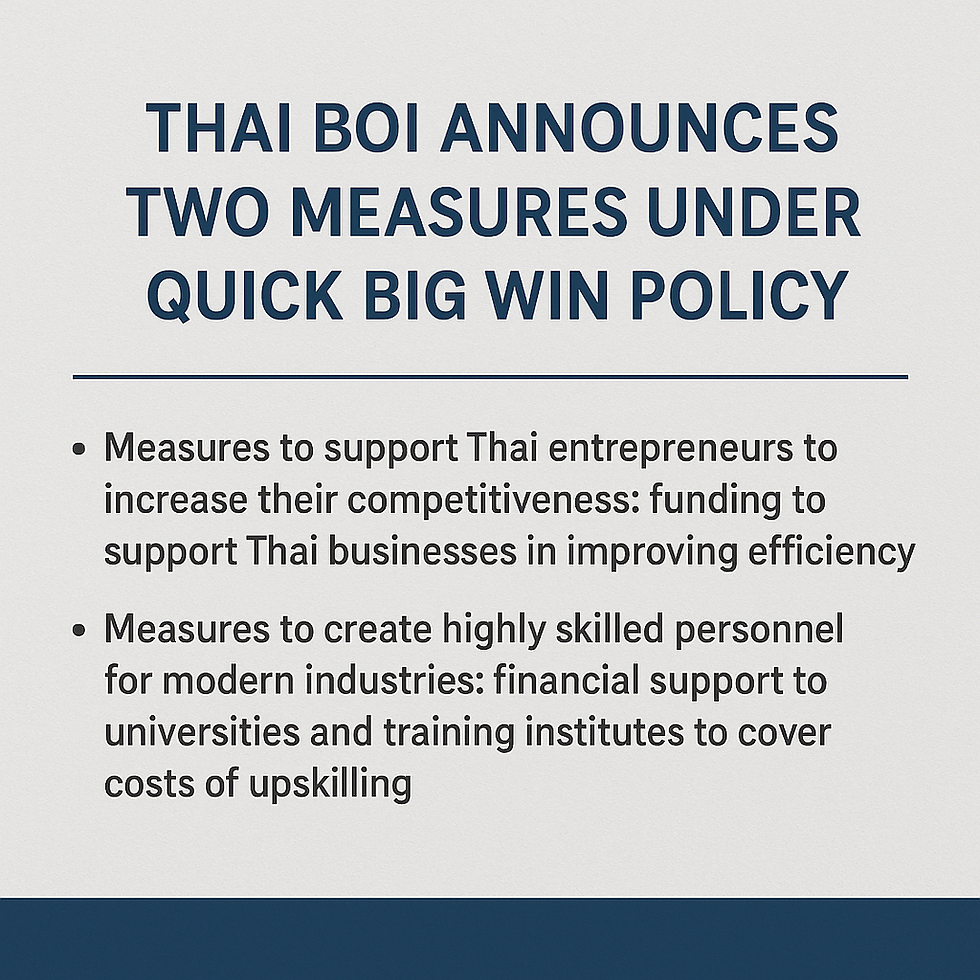Thai Government Plans to Extend Real Estates Leasehold Term to 99 Years泰國政府計劃將不動產租賃期限延長至99年
- Kit Amatyakul
- Aug 23, 2025
- 5 min read
Currently, the Thai government is fast-tracking the amendment to the Rights Over Leasehold Asset Act B.E. 2562 (2019), aiming to extend the maximum real estate leasehold term for foreign nationals from 30 years to a significant 99 years. The proposal aims is to attract investment, especially from foreign nationals seeking long-term land leases.
泰國政府目前正在加速修訂佛曆2562年(2019)《租賃資產權利法》,旨在將外國人的最長不動產租賃期限從30年延長至99年。此提案旨在吸引投資,尤其是尋求長期土地租賃的外國人。
The reform was initially launched during the former Prime Minister Srettha Thavisin's tenure and has gained momentum under the control of the ruling Pheu Thai Party. The proposed legislation is now undergoing public consultation before being presented to the Cabinet.
這項改革最初是在前總理賽塔·塔維辛任期內啟動,並在執政黨為泰黨的領導下獲得發展勢頭。擬議的法案目前正在進行公眾諮詢,之後將提交內閣審議。
The reform not only supporting construction, hotels, and commercial development, but also enable initiatives like the Land Bridge project, land reclamation, Housing for Thais, green energy initiatives, and talent hub development. Long-term leaseholds would appeal to major and small investors alike, including operators of hotels, office complexes, and schools. For example, if an international school discontinues operations, a foreign investor could legally acquire a long-term lease and continue using the property.
這項改革不僅支持建築、旅館和商業開發,也推動了「陸橋」計畫、土地改良、「泰國住房」計畫、綠色能源計畫以及人才中心建設等措施。長期租賃將吸引大小投資人,包括酒店、辦公大樓和學校的營運商。例如,如果一所國際學校停止運營,外國投資人可以合法獲得長期租約並繼續使用此物業。
The goal of reforming the bill is to bring it before the legislature as quickly as possible, with expectations for it to be enacted into law by 2025 – ideally within three to four months of the Cabinet consideration.
改革此法案的目標是盡快提交給立法機關,預計到 2025 年能夠頒布成為法律–最好是在內閣審議後的三到四個月內。
Once the bill is approved by the Cabinet, following is the future procedure:
一旦此法案獲得內閣同意,後續程序如下:
l Submission of the bill to the Speaker of the House for agenda inclusion: 14 days.
向眾議院議長提交法案以納入議程:14天。
l First reading in the House of Representatives: 1-3 days.
眾議院一讀:1-3天。
l Consideration by the Extraordinary Committee: 30-60 days.
特別委員會審議:30-60天。
l Second reading, clause by clause: 1 day.
逐條二讀:1天。
l Third reading and final vote: 1 day.
三讀及最終表決:1天。
l Consideration by the Senate: Up to 60 days.
參議院審議:最多60天。
l Prime Minister to submit the bill for Royal Assent: Within 20 days of parliamentary approval.
總理提交法案以便國王御准:議會同意後20天內。
l Publication in the Royal Gazette: Within 30 days.
公佈在在皇家公報:30天內。
The government has include safeguards into the bill to address concern about the national sovereignty. Notably, assets under the right-based property scheme will transfer to the Treasury Department upon lease expiration, becoming part of the nation’s sovereign wealth. However, there are exceptions, such as agricultural land, which is excluded, and there may be other stipulations for certain types of land or assets that cannot be included in the program.
政府已將保障措施納入法案,解決對國家主權的擔憂。值得注意的是,基於權利財產計劃下的資產將在租賃期滿後轉移至財政部,成為國家主權財產的一部分。然而,也存在例外情況,例如農業用地不包含在內,對於某些類型的土地或資產,可能還有其他規定,使其無法納入此計劃。
The core intent of this legislation is not to constitute an act of “selling the nation” but, on the contrary, to establish a mechanism to halt the uncontrolled transfer of national assets as has occurred in the past.
這項立法的核心意圖並非是要構成“賣國”行為,而是要建立一種機制,制止過去發生的國有資產不受控制的轉移。
Under the draft law, measures are put in place to prevent land from being disposed of to foreign entities through nominee arrangements or by virtue of rights granted under various investment promotion schemes. Assets admitted into this scheme, upon expiry of the maximum permissible contractual holding period of ninety-nine (99) years, shall vest in the State and form part of the nation’s sovereign wealth, to be utilized for the enduring benefit of the country.
根據此法律草案,政府採取措施防止透過提名安排或根據各種投資促進計畫授予的權利將土地出售給外國實體。納入此計劃的資產,在最長允許合約持有期九十九(99)年到期後,將歸國家所有,成為國家主權財產的一部分,用於國家持久利益。
Economic Benefits of the “Property-Based Rights” Law:
“財產權”法的經濟效益:
· Attracting Foreign Investment – The law will draw substantial foreign investment into Thailand’s real estate sector, including high-end buildings, infrastructure, villages, and hotels, generating domestic economic circulation without capital outflow. It also supports long-term economic restructuring policies such as entertainment complexes, the Land Bridge project, housing for Thais, and the government’s financial hub initiative.
吸引外資-此法將吸引大量外資進入泰國房地產產業,包括高端建築、基礎設施、度假村和飯店,從而促進國內經濟循環,避免資本外流。此法也支持長期經濟結構調整政策,例如娛樂中心建設、陸橋計畫、泰國居民住房以及政府的金融中心計畫。
· Reducing Illegal Practices – By lowering incentives for using nominees to hold assets, the law enhances transparency and resolves conflicts arising from multiple existing laws (e.g., EEC Act, BOI Act, IEAT Act). It will also make nominee-related violations—often difficult to trace—less common.
減少非法行為-透過降低利用代理人持有資產的動機,該法律提高了透明度,並解決了多項現有法律(例如《EEC法案》、《BOI法案》、《IEAT法案》)之間產生的衝突。這還將減少匿名相關的違規行為—這些違規行為通常難以追蹤變得沒那麼常見。
· Supporting Thailand as a Talent Hub – The law will attract high-potential global talent to live and work in Thailand, with long-term property lease rights serving as a guarantee for their continued contribution to the Thai economy.
支持泰國成為人才中心—此法將吸引具有高潛力的全球人才到泰國生活和工作,並以長期的房地產租賃權作為他們持續為泰國經濟做出貢獻的保證。




Comments